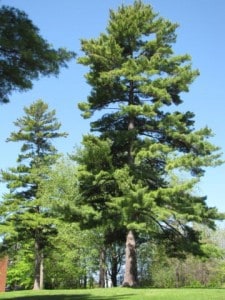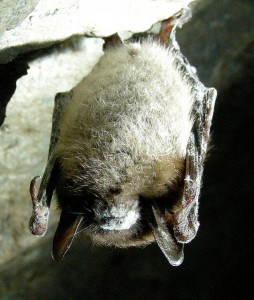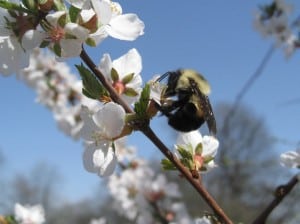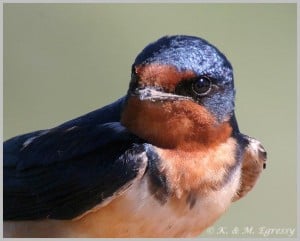As much as news reports of dying sequoia trees in California, disappearing seabird colonies in Iceland, and lifeless coral reefs in the Pacific Ocean are disturbing, these impacts of climate change are still far-removed from our everyday experience. We, of course, don’t live in these far-flung places; we live in Peterborough or Lakefield, on Chemong Lake, or maybe in the Cavan Hills. For most of us, many of the consequences of a changing climate have yet to be felt personally. However, it’s only a matter of time. The impacts won’t only be on our financial and physical well-being. They will be deeply emotional, as well.
A part of our identity and sense of well-being merges with the places we call home, spend our summers, our visit regularly. We feel an emotional connection to the landscapes that surround us, the plants and animals that are our neighbours and the rhythm of the seasons. For those of us of a certain age, we hold fond memories shaped by myriad springs, summers, falls and winters. We have a strong sense of “how this time of year ought to be.” The memory of what the weather was once like is intimately linked to events in our lives. This, in turn, provides a sense of how things are changing. Rather than picking strawberries in early July, we now pick them in June; a birthday which used to coincide with blooming lilacs now lines up with the first primrose; a backyard rink which was once a rite of December is now relegated to mid-winter – or not possible at all.
I frequently hear stories about the sadness brought on by the decline of much-loved species or the degradation of cherished habitats that had become part of people’s lives. When this happens, there is often a deep sense of loss, whether it is the result of climate change, urban development, invasive species or any number of other causes. This emotional impact of a degraded natural world goes under-reported but is very real. Here are just a few stories I have heard personally. I would be interested in hearing yours, too.
· The cottager on Salmon Lake who, for 50 years, enjoyed a daily ritual of sitting on the dock in the evening, a coffee in hand, watching the bats twist and turn as they hunted insects over the lake. The bats are no more, replaced by nostalgia and sadness.
· The farmer in Ennismore who, since childhood, was kept company every spring and summer by the chatter and coming and going of dozens of swallows nesting in the barn. The barn has turned eerily silent in recent years.
· The angler who laments the drastic decline in brook trout in local creeks, and how trout fishing in the spring was once such a part of his life.
· The golfer who mourns the passing of the towering, graceful American elms that were once the signature tree of the Peterborough Golf and Country Club.
· The Stony Lake cottager who still carries the emotional pain of seeing her giant white pines blown down in a single storm.
· The Trent student who did intensive research on local bumblebees in the 1980s. When he returned to the same research sites in 2013, he was unable to find any of the bumblebee species that had once been so common. In a letter to the editor of this paper, he wrote, “To me, the woods and glades of beautiful places like Jackson Park now fill me with an aching sense of loss and despair. Little did I know that my thesis studies would be more epitaph than ecology. What have we done?”
These feelings now have a name – solastalgia. It is the pain or anguish caused by the loss of solace from a loved environment because of its degradation. It is being felt all over the world, especially among indigenous peoples. Researchers interviewed 120 native people in Labrador in what is called the Inuit Mental Health Adaptation to Climate Change project. The North Labrador Coast is one of the fastest-warming areas in the world. Wildlife and vegetation patterns have changed, and sea ice forms later in the fall and breaks up earlier in the spring. People reported sadness and even depression about not being able to travel on the ice to reach hunting grounds as early or late in the year as they used to.
How are scientists feeling?
It is revealing to hear the emotional reaction of climate scientists themselves to a warming world. These people aren’t robots in white lab coats. They are mothers, fathers and grandparents who see the impacts and feel the emotional effects of climate change first-hand. Here are some testimonies taken from a website called isthishowyoufeel.com
· “I feel frustrated that I cannot even convince those closest to me that we, as a society, are being irresponsible, and that our children and grandchildren will pay the price. Don’t we feel compassion for the life we are signing them up for?” Anna Harper, Research Fellow, University of Exeter
· “I am a scientist mostly focussed on studying how human activities are destroying coral reefs. On coral reefs, climate change effects are hugely obvious and very depressing. Huge swaths of coral have died due to heat stress, and it will continue unless drastic changes occur.” Dr. Jessica Carilli, UMass, Boston.
· “How do I feel about climate change? I feel afraid for my grand children and for my family. It keeps me awake at night. I am frustrated with complacency. Parents who would leap between a bear and a child live in ignorance, confusion, or at best, fear. Leap into the climate debate, mom and dad. Still, I feel excitement that we can fix this. We have the plans, policies and technology. We can have great lives with clean, safe, renewable energy. Please help! Get involved. Demand action on climate at all political levels.” Dr. James Byrne, University of Lethbridge
· “My overwhelming emotion is anger; anger that is fuelled not so much by ignorance, but by greed and profiteering at the expense of future generations… I am speaking as a father of a seven year-old girl who loves animals and nature in general. As a biologist, I see irrefutable evidence every day that human-driven climate disruption will turn out to be one of the main drivers of the Anthropocene mass extinction event now well under way.” Professor Corey Bradshaw, University of Adelaide
· “I’m lucky to have been a marine biologist for the last 20 years. I look at my underwater photos of amazing coral reefs, diverse fish and baby turtles hatching and I feel very sad that my son, his friends and their children may never see the amazing things I have seen.” Dr. Jennie Mallela, Australian National University
· “I will keep doing my work. I will keep shouting in my own little way. I will be optimistic that we will do something about this, collectively. I live in hope that the climate changes on the graphs that I stare into every day won’t be as bad as my data tells me, because we worked together to find a solution. All I can hope is that people share my optimism and convert it into action.” Dr Ailie Gallant, Monash University.
Everywhere we look, climate change predictions are being confirmed. If you believe in science – humankind’s best way of discovering what’s true – you have to believe that forecasts for the coming years will prove true, as well. Yes, it’s difficult to think beyond the present moment and the many worries and stresses of everyday life. However, we can’t put our heads in the sand. Even meeting Canada’s timid commitments under Stephen Harper to lower greenhouse gas emissions by 30% below 2005 levels by 2030 will be difficult to achieve. The bottom line is that we will have to accept paying a great deal more for fossil fuels, if we are to usher in an age of renewable energy. At this late date, it’s the only way forward. Let’s encourage our politicians to adopt an aggressive and quickly increasing price on carbon.



